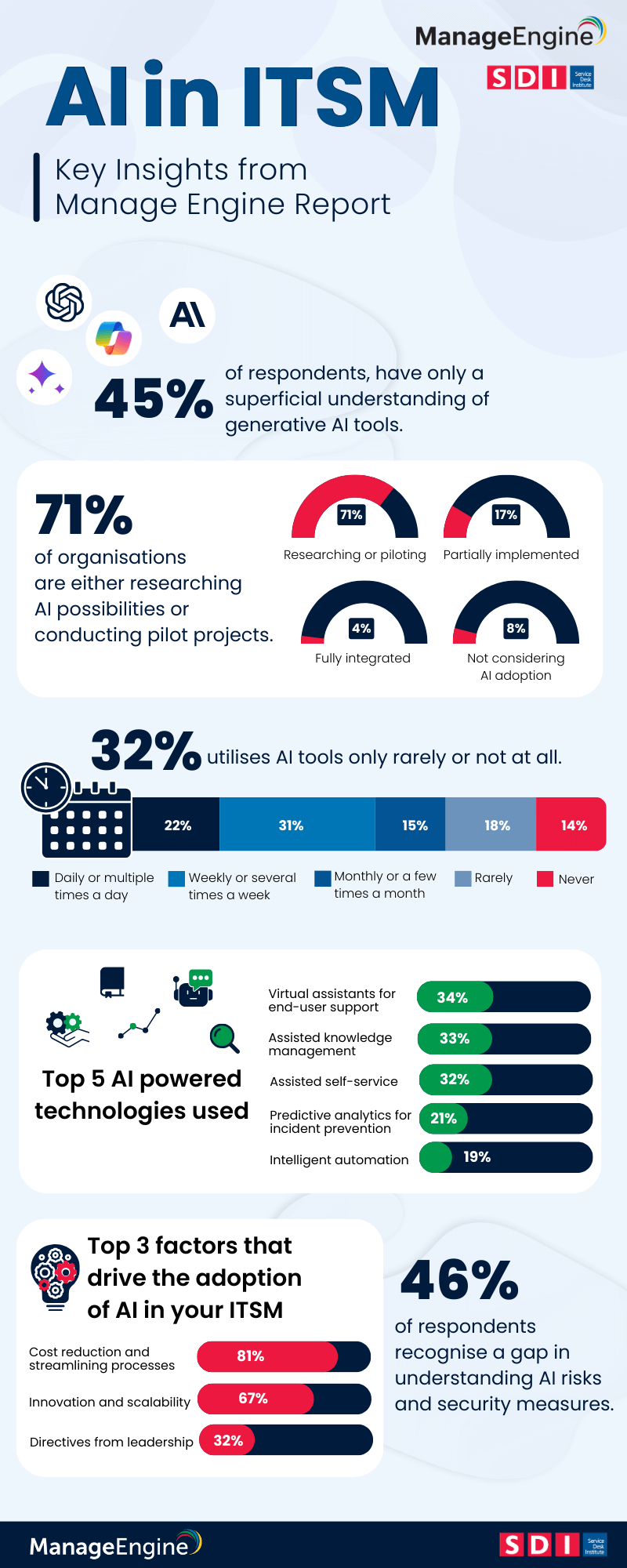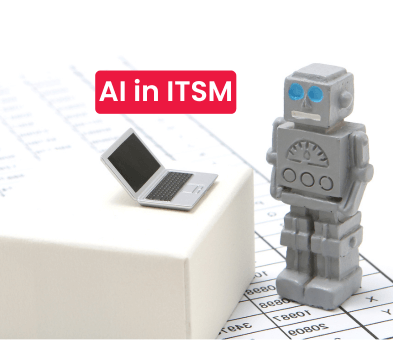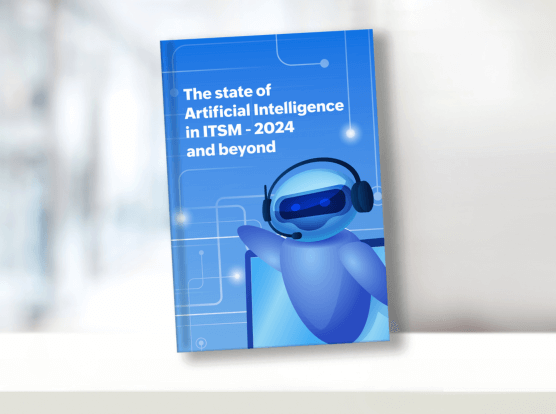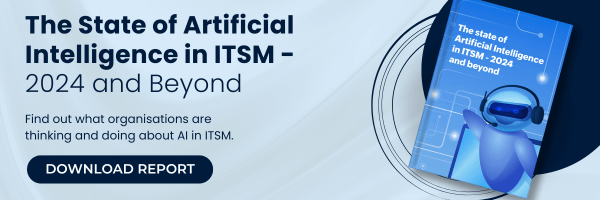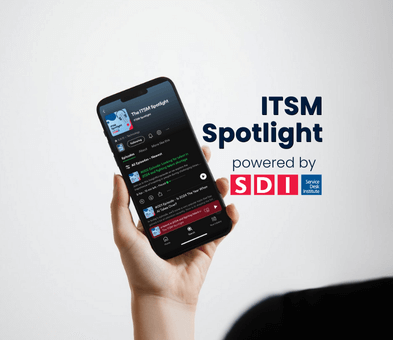There is a growing trend towards integrating AI-based capabilities within ITSM processes. According to our recent research, 71% of organisations are researching or piloting AI in ITSM, while only 4% have fully integrated AI into their IT service management.
These statistics indicate that while many organisations are aware of AI’s potential, full integration is still low. Why? Moving from pilot projects to wider implementation typically comes with some challenges, including technological, financial, or cultural barriers within organisations.
To leverage AI’s potential more effectively, tailored strategies are needed to address those specific challenges and concerns.
These concerns also often revolve around increasing awareness, enhancing governance and security, managing risks, and ensuring organisations are well-prepared for AI integration.
So, the big questions here are what and how.
👉 How can organisations improve their awareness and understanding of AI capabilities?
👉 What are the most common barriers organisations face?
👉 Which specific AI technologies are most effective in improving ITSM processes?
To get some answers, we partnered with ManageEngine and conducted a survey on the adoption of AI in the ITSM ecosystem. In this article, we’ll share key findings from the report ‘The state of AI in ITSM – 2024 and beyond’.
Let’s dive in and explore the most significant barriers to successful AI adoption.
Key findings:
🔷 75% of respondents are confident in understanding fundamental AI concepts, generative technologies, and ethical implications of AI in practice.
🔷 46% of respondents rated their understanding of AI risks and security measures lower, suggesting a need for increased awareness and education in this area.
🔷 45% of respondents have only a superficial understanding of generative AI tools.
🔷 68% of respondents use generative AI regularly in their day-to-day job roles, while 32% use it rarely or don’t use it at all.
🔷 25% of respondents indicate that their organisations lack any governance framework for AI implementation or are unaware of it.
🔷 62% of respondents indicate that integrating AI into their existing ITSM tools is challenging.
🔷 81% of organisations are driven by cost reduction in AI adoption.
🔷 Virtual assistants assisted knowledge management, and self-service lead AI adoption in ITSM operations.
🔷 Skills shortage tops the list of challenges in AI adoption for ITSM operations.
🔷 Security in AI implementation was identified as a major area of concern and lack of expertise.
Understanding AI: Confidence and Gaps in Knowledge
Based on the research data, 75% of respondents stated they are confident in understanding fundamental AI concepts, generative technologies, and ethical implications of AI in practice.
These results are promising, as they indicate a growing interest in AI technologies and provide us with a better understanding of people’s perspectives on AI.
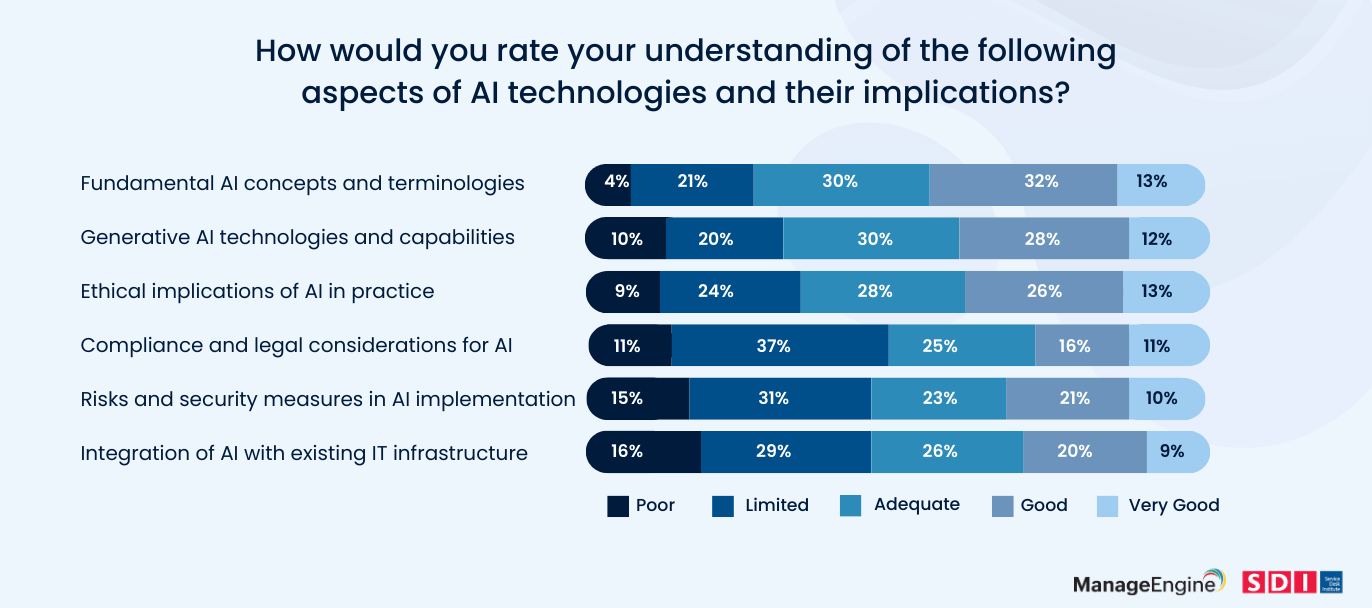
Similarly, most respondents (40%) stated they have a relatively strong knowledge of generative AI technologies. But we can also recognise gaps in understanding AI risks, security measures, and integration with existing infrastructure.
45% of respondents stated that they have a poor or limited understanding of integrating AI with existing infrastructure, suggesting a potential knowledge and skills gap.
This suggests a need for increased awareness, education, and resources to help organisations better understand and address the complex challenges associated with ai-related risks and security.
Adoption of AI: Usage, Challenges, and Governance
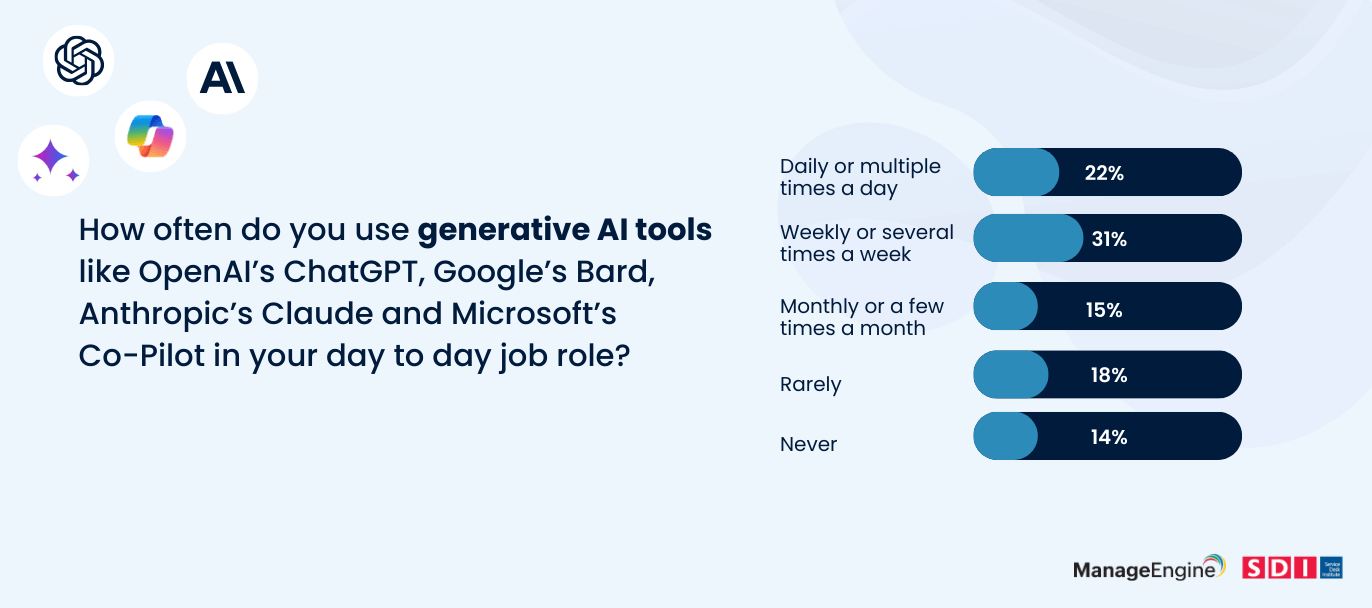
Generative AI technologies are being used to automate routine tasks, enhance knowledge management, and improve self-service capabilities for end-users. But only 53% of respondents stated they use generative AI such as ChatGPT, Microsoft’s Copilot or Google’s Bard regularly. Around 32% use it rarely or don’t use it at all.
More than half of respondents stated their organisation adheres to internal guidelines and industry standards for AI implementation, but 38% lack a governance framework. This clearly indicates that we need more transparent, robust governance structures to oversee AI initiatives.
The survey also reveals that most respondents find integrating AI with existing ITSM tools challenging, indicating potential compatibility issues or the need for more adaptable AI solutions.
Some common challenges most organisations are facing are:
- Aligning AI initiatives with existing IT processes
- Ensuring interoperability with legacy systems
- Managing the cultural shift towards AI-driven operations
Drivers and Barriers to AI Adoption in ITSM
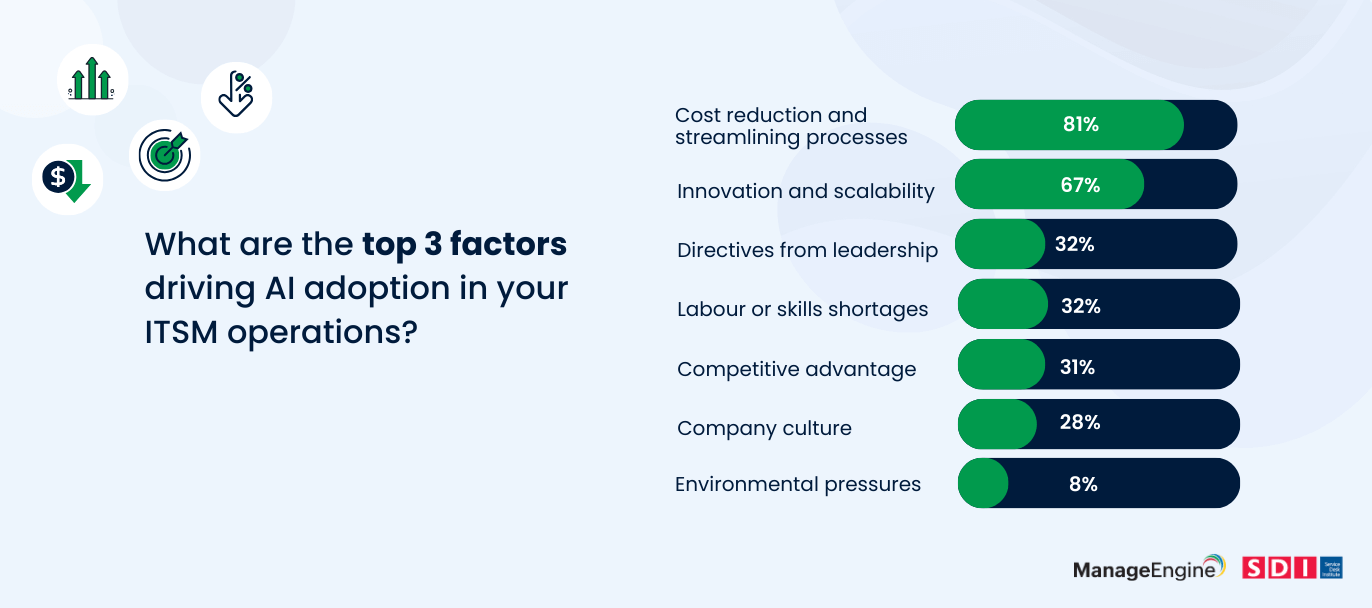
Cost reduction seems to be the primary driver for AI adoption in ITSM, with 81% of respondents citing it as a major motivator, followed by improved innovation and scalability.
Leadership directives also play a significant role, indicating top-down influences in adopting new technologies.
This suggests that organisations see AI not just for its immediate benefits, but also for its potential to support growth and adapt to changing demands.
When it comes to the top-used AI-powered technologies, virtual assistants, assisted knowledge management, and assisted self-service are at the top of the list. This reflects a focus on developing a self-serving end-user culture.
But the journey to AI adoption is not without its challenges. The main challenges include skills shortages, budget constraints, and security concerns. It’s no surprise that skills shortages are a top barrier. Organisations still struggle to find and retain talent with the expertise needed to develop, implement, and maintain AI systems. This often prevents teams from effectively leveraging AI technologies, impacting overall productivity and the ability to innovate.
The solution?
Organisations will need to invest in targeted AI education programs to bridge knowledge gaps, particularly in integrating AI with existing IT infrastructure.
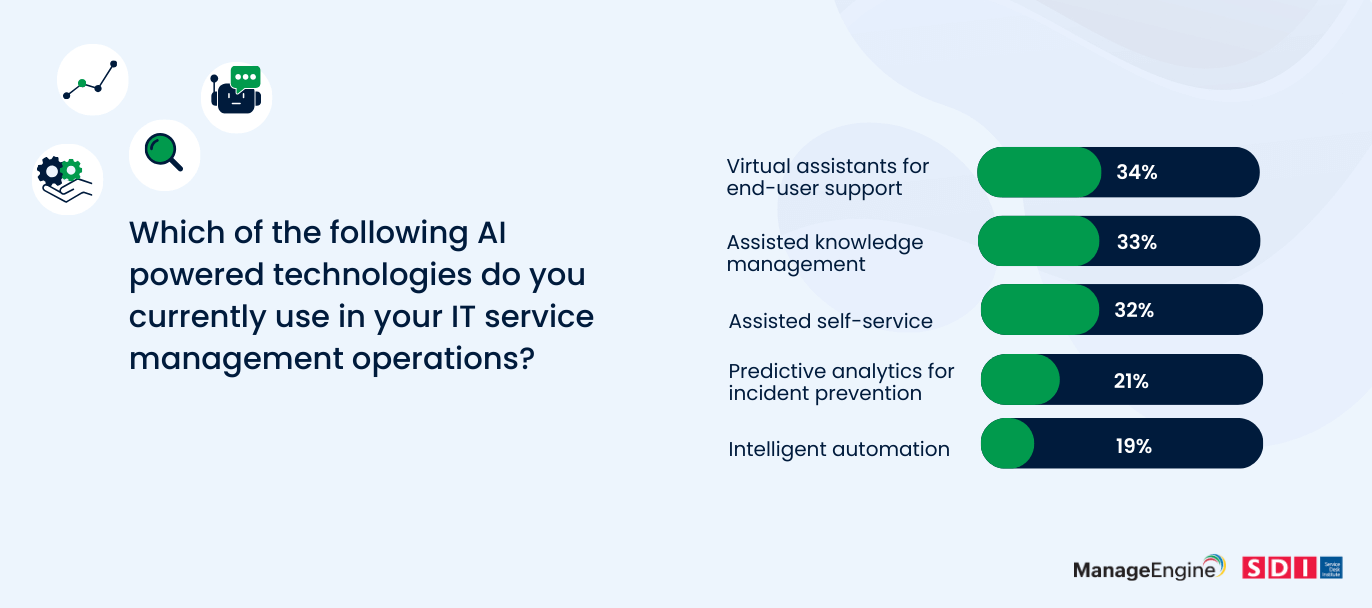
Overcoming AI barriers through continuous learning
Despite challenges like skill shortages, budget constraints, and governance issues, AI has a bright future in ITSM. Nearly half of the respondents are actively researching or piloting AI, showing a strong interest in overcoming these barriers.
Embracing AI will pave the way for sustainable growth and success in ITSM.
So, organisations should consider fostering a culture of continuous learning and adaptability. This is crucial to leveraging AI effectively and responsibly. They should also invest in training, establish robust governance frameworks, and balance AI with human expertise.
🔗 Download The state of AI in ITSM – 2024 and beyond report to get complete insights. Explore key findings on AI integration, adoption challenges, and strategic recommendations.
Or watch our on-demand webinar where Kumaravel Ramakrishnan and David Wright unpack key insights from the report to help you navigate the true potential and concerns of AI in ITSM.
